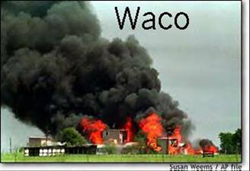A Bad Week in History: Waco, Oklahoma City and Columbine

Today is a bad day for history. It is the anniversary of the tragic deaths of the Branch Davidians at Waco in 1993.
It is also the 12th anniversary of the 1995 Oklahoma City bombing. (Disclosure: I was one of Timothy McVeigh's trial lawyers, so don't bother ranting about him in the comments, it will be deleted.)
Tomorrow, April 20, is the anniversary of the Columbine killings.
One of the lasting legal effects of the OKC bombing was President Bill Clinton's Anti-Terrorism and Death Penalty Enforcement Act (pdf), which restricted habeas corpus rights and added many new death penalty eligible offenses.
Like I said the other day about why we shouldn't rush to enact gun control laws in the aftermath of Virginia Tech, we should never enact laws as an emotional response to a single tragedy, no matter how horrific. Cooler heads are needed.
| < Torturer-Rapist At Large Near Columbia University | Giulani in Oklahoma Today, Leading the OKC Memorial > |



